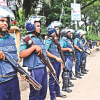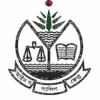Human rights defenders feel insecure
Law enforcers harass people by filing false cases and picking them up, rights defenders alleged yesterday at a discussion on the country's human rights situation.
In the past, people's biggest fear used to be extremists but now that has been replaced by fear of enforced disappearances or being killed in crossfire by the law enforcement agencies, Abdur Rahman, a rights defender from Jhenidah, observed.
“Whenever any incidents of crossfire happen in my district, we are monitored for our roles in condemning the crime,” he said, adding, "It is an unpleasant truth for rights' defenders,” he said, while demanding safety for the field-level rights defenders.
Rashed Ripon from Rajshahi, another rights defender, claimed that harassment by police was on the rise.
Around 30 human rights defenders from across the country joined the discussion titled “Civil Society Dialogue with National Human Rights Commission Bangladesh”. Rights body Ain o Salish Kendra (ASK) organised the event at CIRDAP auditorium.
ASK placed a position paper at the discussion highlighting the limitations of NHRC in investigating allegations against law enforcement agency members, the role of the commission in protecting the rights of minorities, its initiatives to stop extrajudicial killing and enforced disappearance and also to demand a law for the protection of rights defenders.
While sharing their views, the rights defenders criticised the NHRC for not playing an effective role in protecting human rights.
Referring to the issues of enforced disappearances, killings in crossfire and other violations of rights allegedly by law enforcement agencies, the defenders urged the commission to play a stronger role in investigation of such cases to identify the perpetrators.
They also asked the commission to run more independent investigations into the cases.
Referring to section 18 of the National Human Rights Commission Act 2009, the ASK said although there is no obligation for the commission to investigate allegations against law enforcement agencies, the section is often misinterpreted to mean that the commission cannot investigate such cases.
ASK also brought up the misuse of section 57 in ICT act which made the government take a decision on repealing the act. They added that they want NHRC to play a significant role so that anything like section 57 cannot be introduced in the proposed Digital Security Act.
ASK further demanded that the government allow NHRC to directly investigate the cases where the law enforcement agencies are involved.
Rights defenders said they want NHRC to work at grassroots by expanding its activities.
A participant from Naogaon, Zakaria Al Mamun, said there is a gap between the expectation and returns from the NHRC. "The activities of the NHRC should be visible on a field level."
The NHRC Chairman Kazi Reazul Hoque said that they proposed to open an office at divisional levels. However, appointment for the new positions was tough.
He stressed that while there were no financial obstacles of the commission to recruit people, the real problem lay with the bureaucratic system of the country. “We proposed an organogram of 139 officials to open offices at divisional levels,” he added.
The NHRC chairman said police do not give them investigation reports in cases where law enforcers are allegedly involved.
“Whenever we ask for any probe report, police say 'it's under investigation'. Six months to one year go by, but the report never comes,” he said.
On enforced disappearances, Reazul said they write demi official letters to home minister and inspector general of police for every such incident, requesting them to find the victims and punish the perpetrators. Some of the missing people have already returned, he added.
“We do not know who is missing or who had fallen victim to enforced disappearances. But it is the responsibility of the state to find them,” he said.
NHRC has independently investigated a few sensational cases but cannot investigate them all, he said, adding that they take cases, which have merit, and help the victims until a charge is framed.
The body requested NHRC to form an independent commission on extrajudicial killings and enforced disappearances and organise public hearings on the issues.
ASK Executive Director Sheepa Hafiza presided over the programme.

 For all latest news, follow The Daily Star's Google News channel.
For all latest news, follow The Daily Star's Google News channel. 







Comments